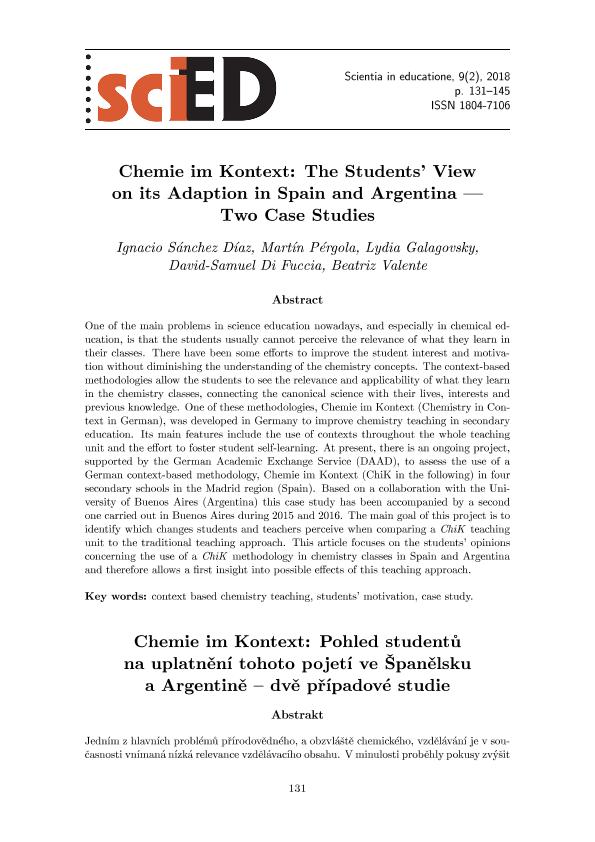Mostrar el registro sencillo del ítem
dc.contributor.author
Sánchez Díaz, Ignacio
dc.contributor.author
Pérgola, Martín Sebastián

dc.contributor.author
Galagovsky, Lydia Raquel

dc.contributor.author
Di Fuccia, David Samuel
dc.contributor.author
Valente, Beatriz
dc.date.available
2022-07-08T19:03:51Z
dc.date.issued
2018-12
dc.identifier.citation
Sánchez Díaz, Ignacio; Pérgola, Martín Sebastián; Galagovsky, Lydia Raquel; Di Fuccia, David Samuel; Valente, Beatriz; Chemie im kontext: the students’ view on its adaption in Spain and Argentina. Two case studies; Univerzita Karlova; Scientia in Educatione; 9; 2; 12-2018; 131-145
dc.identifier.issn
1804-7106
dc.identifier.uri
http://hdl.handle.net/11336/161786
dc.description.abstract
One of the main problems in science education nowadays, and especially in chemical education, is that the students usually cannot perceive the relevance of what they learn in their classes. There have been some efforts to improve the student interest and motivation without diminishing the understanding of the chemistry concepts. The context-based methodologies allow the students to see the relevance and applicability of what they learn in the chemistry classes, connecting the canonical science with their lives, interests and previous knowledge. One of these methodologies, Chemie im Kontext (Chemistry in Context in German), was developed in Germany to improve chemistry teaching in secondary education. Its main features include the use of contexts throughout the whole teaching unit and the effort to foster student self-learning. At present, there is an ongoing project, supported by the German Academic Exchange Service (DAAD), to assess the use of a German context-based methodology, Chemie im Kontext (ChiK in the following) in four secondary schools in the Madrid region (Spain). Based on a collaboration with the University of Buenos Aires (Argentina) this case study has been accompanied by a second one carried out in Buenos Aires during 2015 and 2016. The main goal of this project is to identify which changes students and teachers perceive when comparing a ChiK teaching unit to the traditional teaching approach. This article focuses on the students’ opinions concerning the use of a ChiK methodology in chemistry classes in Spain and Argentina and therefore allows a first insight into possible effects of this teaching approach.
dc.description.abstract
Jedním z hlavních problémů přírodovědného, a obzvláště chemického, vzdělávání je v současnosti vnímaná nízká relevance vzdělávacího obsahu. V minulosti proběhly pokusy zvýšit zájem žáků a motivovat je, aniž by došlo ke snížení jejich porozumění chemickým konceptům. Na kontextu založené (context-based) metodologie umožňují žákům vidět relevantnost a aplikovatelnost učiva chemie, spojuje kanonické přírodní vědy s životy žáků, zájmy a předchozími znalostmi. Jedna z těchto metodologií, Chemie im Kontext (chemie v kontextu, z němčiny), byla vyvinuta v Německu za účelem vylepšení výuky chemie na středních školách. Její hlavní prvky zahrnují využívání kontextů v celé výukové jednotce a klade důraz na utváření schopnosti žáků učit se (self-learning). V současnosti je realizován projekt podporovaný německou agenturou DAAD, který má za cíl hodnotit německou metodologii context-based přístupu. Projekt Chemie im Kontext (ChiK) probíhal na čtyřech středních školách v madridském regionu (Španělsko). V předkládané případové studii je zmíněný projekt doplněn druhým, realizovaným ve spolupráci s University of Buenos Aires (Argentina) mezi lety 2015 a 2016. Hlavním cílem tohoto projektu bylo identifikovat změny, které žáci a učitelé vnímali mezi ChiK a tradičním pojetí výuky. Tento příspěvek se zaměřuje na názory žáků k využití ChiK ve výuce chemie ve Španělsku a Argentině, čímž umožňuje první náhled na možný efekt tohoto přístupu k výuce.
dc.format
application/pdf
dc.language.iso
eng
dc.publisher
Univerzita Karlova
dc.rights
info:eu-repo/semantics/openAccess
dc.rights.uri
https://creativecommons.org/licenses/by/2.5/ar/
dc.subject
CONTEXT BASED CHEMISTRY TEACHING
dc.subject
STUDENTS' MOTIVATION
dc.subject
CASE STUDY
dc.subject.classification
Otras Ciencias de la Educación

dc.subject.classification
Ciencias de la Educación

dc.subject.classification
CIENCIAS SOCIALES

dc.title
Chemie im kontext: the students’ view on its adaption in Spain and Argentina. Two case studies
dc.title
Chemie im kontext: pohled studentů na uplatnění tohoto pojetí ve Španělsku a Argentině. Dvě případové studie
dc.type
info:eu-repo/semantics/article
dc.type
info:ar-repo/semantics/artículo
dc.type
info:eu-repo/semantics/publishedVersion
dc.date.updated
2021-01-18T14:10:05Z
dc.journal.volume
9
dc.journal.number
2
dc.journal.pagination
131-145
dc.journal.pais
República Checa

dc.journal.ciudad
Praga
dc.description.fil
Fil: Sánchez Díaz, Ignacio. University of Kassel; Alemania
dc.description.fil
Fil: Pérgola, Martín Sebastián. Consejo Nacional de Investigaciones Científicas y Técnicas. Oficina de Coordinación Administrativa Ciudad Universitaria; Argentina. Universidad de Buenos Aires. Facultad de Ciencias Exactas y Naturales. Centro de Formación e Investigación en Enseñanza de las Ciencias; Argentina
dc.description.fil
Fil: Galagovsky, Lydia Raquel. Universidad de Buenos Aires. Facultad de Ciencias Exactas y Naturales. Centro de Formación e Investigación en Enseñanza de las Ciencias; Argentina
dc.description.fil
Fil: Di Fuccia, David Samuel. University of Kassel; Alemania
dc.description.fil
Fil: Valente, Beatriz. Instituto Libre de Segunda Enseñanza; Argentina
dc.journal.title
Scientia in Educatione
dc.relation.alternativeid
info:eu-repo/semantics/altIdentifier/url/https://ojs.cuni.cz/scied/article/view/1028
dc.relation.alternativeid
info:eu-repo/semantics/altIdentifier/doi/https://doi.org/10.14712/18047106.1028
Archivos asociados
